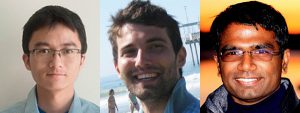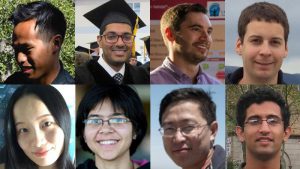#1 Employer of CNS-Affiliated Recent Graduates? It’s Google
Most of the Ph.D. and M.S. students who worked in the labs of Center for Networked Systems (CNS) member faculty are well-positioned to land a great job after graduation. A few remain in academia, but the vast majority go to jobs in the technology industry, and not just any jobs. According to a survey of 16 CNS-affiliated graduate students who matriculated in 2015-2016, fully half of the mostly Computer Science and Engineering graduates now work for Google, with others going to fast-track jobs at Apple, Facebook, and other tech giants.
Staying in academia
Only a few graduating CNS students are staying in academic environments. According to CNS co-director George Porter, “that’s more than 18 percent of our 16 recent graduates, and that’s probably pretty standard among the top 20 schools.”

After working with his advisor, CSE Prof. YY Zhou, Peng (Ryan) Huang (Ph.D. ’16) was offered a tenure-track position as Assistant Professor in computer science at Johns Hopkins University. He was offered the job because the university is trying build a new area of strength in Huang’s area – computer systems. “I’m particularly interested in understanding growing problems in real-world systems and reflecting that understanding in new techniques to improve system reliability,” says Huang. In his dissertation, Huang analyzed the distinctive characteristics of failures in industrial-strength cloud systems. (For more on Huang, see news release at http://www.cse.ucsd.edu/node/2982.)
Since graduating in June 2015, Baris Aksanli (Ph.D. ’15) remains affiliated with CNS as a postdoctoral researcher in Tajana Rosing’s lab. Then in August 2016, he became an Assistant Professor in the Electrical and Computer Engineering department of San Diego State University (SDSU), where Aksanli teaches embedded-systems courses and real-time operating systems. On the research side he continues to work on energy efficiency in various domains, including embedded systems, data centers, Internet of Things, and cyber-physical systems. Aksanli did two internships in graduate school, one at Intel (in 2012), the other at Lawrence Berkeley National Laboratory (2011).
Bharathan Balaji (Ph.D. ’16), who previously received his M.S. in 2011 from the ECE department before transferring to CSE, is also remaining in academia. He recently joined UCLA as a postdoctoral researcher in the lab of Prof. Mani Srivastava, a longtime collaborator of Balaji’s UCSD advisor Rajesh Gupta (and co-advisor Yuvraj Agarwal, now at Carnegie Mellon). Balaji’s research focused on improving energy efficiency of buildings by creating software applications that exploit existing infrastructure to provide services such as information organization, fault detection, personalized control, and sensing when an occupant is in the building. As a grad student, Balaji did an internship at Ericsson Research (working on a Wi-Fi-based occupancy sensing solution).
Google hires 50% of CNS recent graduates
Google may be the most sought-after employer of computer science Ph.D. graduates, so it’s perhaps no surprise that Google hired more CNS recent graduates than any other company (all of them armed with degrees from CSE at UC San Diego). Fully half of the graduates – eight of the 16 CNS recent alumni – are now employed at Google.

(2nd Row L-R) Liqiong Yang, Malveeka Tewari , He (Lonnie) Liu, Rishi Kapoor
On September 15, Wilson Wing-Soon Lian (M.S., Ph.D. ’13, ’16) defends his dissertation on “JIT Spraying Threats on ARM and Defense by Diversification”. Lian’s dissertation committee was co-chaired by his advisors, Stefan Savage and Hovav Shacham. Lian says his research interests are “broadly in security and privacy, but lately I’ve been looking at the security of Just-In-Time compilers.” As a graduate student from 2010 to 2016, he was hired and re-hired at Google for three summer internships in 2012, 2013 and 2015, so it’s no surprise that, with his Ph.D. in sight, Lian has already accepted a job at… Google. He’ll be a full-time software engineer.
Jagannathan Venkatesh (Ph.D. ‘16) graduated in June after defending his dissertation on “A Context-Aware Approach to Residential Grid Automation.” In his thesis, Venkatesh proposed “using context – additional high-level information – about elements of the smart grid (sources, loads and storage) to improve the efficiency of its operations.” At the all-campus graduation ceremony, his advisor Tajana Rosing was on hand (pictured at right with Venkatesh). Today the CSE and CNS alumnus works at Google, where he had previously done three internships in 2011, 2012 and 2013, including the development of a testing framework for video ads, a tool to search, analyze and debug Google’s social back-end data, and designing user interfaces that are intuitive to users and reusable by developers.
Mike Conley (M.S., Ph.D. ’12, ’15) completed graduate school in computer science under George Porter and Amin Vahdat. His primary research interests were in the areas of big data, I/O-intensive computation, distributed systems, cloud computing, MapReduce, data centers and high-speed sorting. Conley’s doctoral dissertation on “Achieving Efficient I/O with High-Performance Data Center Technologies,” focused on the performance of storage and network I/O in large-scale distributed systems (notably on TritonSort and Themis), and he demonstrated how to run such applications on a wide variety of hardware platforms, from solid-state disks to supercomputers. Since October 2015, Conley has been a software engineer at Google in Mountain View, CA, where he also did internships in 2010 and 2011.
Tristan Halvorson (Ph.D. ’15) studied the domain name market, measuring the market with web and whois data to determine the goal of domain name registrants. Previously with his advisors Stefan Savage and Geoffrey Voelker, Halvorson investigated email spam from a monetary perspective by measuring many email spammers’ costs and revenue. He also spent the summer of 2012 on an internship with Yahoo!’s email anti-spam team, with whom he analyzed data on Hadoop to look for compromised webmail accounts.) On graduation, he joined Google as a software engineer.
Rishi Kapoor (M.S., Ph.D ’11, ’15) is now a software engineer at Google, where he had previously done two summer internships in the company’s platform networking group. He completed his Ph.D. under Amin Vahdat and George Porter. His research interests were in areas including systems, data center networks, distributed networks and network security. Kapoor’s primary focus was on integrating the end-host stack with the data center network fabric. “By coupling the end host and the data center network fabric,” argued Kapoor, “it is possible to achieve stringent performance properties of next-generation data center networks and applications.”
He (Lonnie) Liu (Ph.D. ’15) joined Google after completing his doctorate, despite having done two summer internships at Microsoft Research. He worked under Geoffrey Voelker and Stefan Savage in the Systems and Networking group of CSE. Liu was the first author of a December 2015 published report on “Scheduling Technologies for Circuit/Packet Networks”, co-authored with his advisors as well as other CNS members including George Porter, Alex Snoeren and George Papen.
Malveeka Tewari (M.S., Ph.D. ’11, ’15) worked under advisors George Porter and Amin Vahdat. Her areas of interest included Networked Systems, Distributed Computing, Data Center Networks, and Software-Defined Networks. As a graduate student, she did one internship at Amazon Web Services and spent the summers of 2011 and 2012 at Google in Mountain View, CA. For her dissertation, Tewari focused on “Enabling Fine-Grained Network Flow Management in Data Center Networks and Servers.” She now works at Google as a software engineer.
After completing her computer-science degree in June, Liqiong Yang (M.S. ’16) became one of the latest CSE graduates hired by Google, which she joined in August as a software engineer in the Cloud SQL group. Yang was a computer-science research assistant for two years at Peking University before enrolling in the master’s program at UC San Diego in 2012. She also did a software engineering internship at China’s Baidu, Inc., and, in summer 2015, Yang did an internship with CSE Prof. YY Zhou’s Whova startup. She has also TA’d courses in discrete mathematics (CSE 20) and operating systems (CSE 120).
Apple, Facebook lead other high-tech hires
Following Bhanu Chandra Vattikonda’s move to Apple after the 2014-2015 school year (and getting his Ph.D. under Alex Snoeren), another CNS student accepted an employment offer at Apple. Keaton Mowery (Ph.D. ’15) now works there too, after finishing his dissertation under Hovav Shacham. His research interests focused on web security, privacy and general systems security.

Neha Chachra (Ph.D. ’15) is now a research scientist at Facebook. As a member of the Systems and Networking group in CSE, she was advised by professors Stefan Savage and Geoffrey Voelker (her co-authors on a paper delivered at the 2015 Internet Measurement Conference (“Affiliate Crookies: Characterizing Affiliate Marketing Abuse”). Chachra defended her dissertation in December 2015.
Karyn Benson (Ph.D. ’16) used UC San Diego’s Network Telescope while working and doing research on networks and security in the Center for Applied Internet Data Analysis (CAIDA) in the San Diego Supercomputer Center (SDSC). Under advisors Alex Snoeren and K.C. Claffy as well as SDSC’s Alberto Dainotti, she wrote her dissertation on “Opportunistic Internet Measurement with Darknet Traffic.” Benson is now at Akamai Technologies as a performance engineer.
Jinseok Yang (M.S., Ph.D. ’11, ’15) worked under Tajana Rosing starting in 2011. He completed his doctorate in Communication Theory and Systems. Primarily focused on embedded systems, Yang joined LG Advanced Research, after having done a summer internship at in 2012. While in ECE, Yang’s research focused on energy efficiency and data quality in distributed wireless sensor networks, including performance optimization. Eventually those interests evolved beyond sensor networking to include other aspects of networking systems, including applications to the smart grid, sensor swarms (on the multi-university TerraSwarm project launched in 2013) and recommendation systems. Before UC San Diego, Yang received a first master’s degree in 2008 from Ajou University, where he also did his undergraduate work in his native Korea.
Matthew Der (M.S., Ph.D. ’13, ’15) was advised by Lawrence Saul, Stefan Savage and Geoffrey Voelker. His research focused on machine learning and applications to security, in particular, web page clustering and classification. His dissertation focused on “Investigating Large-Scale Internet Abuse Through Web Page Classification.” In the summers of 2011 and 2012, Der interned at Google in San Francisco. Notable publications included “Knock It Off: Profiling the Online Storefronts of Counterfeit Merchandise,” jointly with CNS member faculty Saul, Savage and Voelker. After graduation, Der returned home to Richmond, VA, to become CTO for Notch, a software consulting firm.
